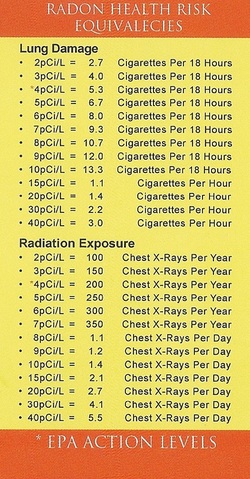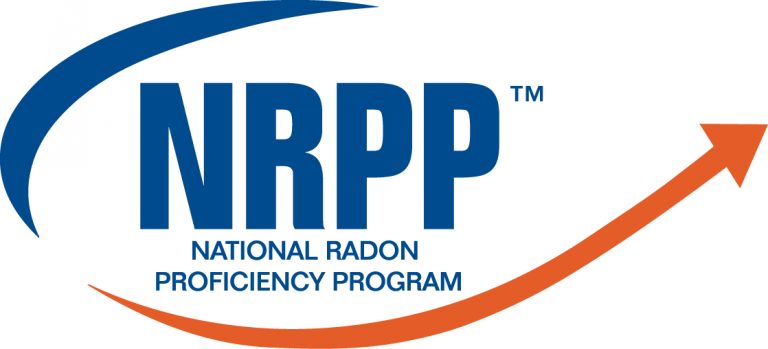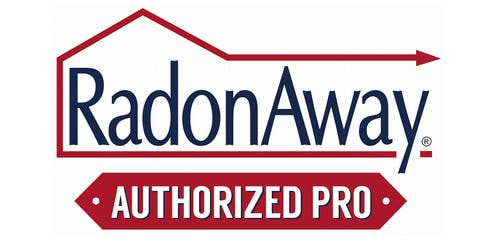|
Real Estate Agents
Peoria Radon Mitigation will help you meet your closing deadlines! Please complete a Realtor Quote Request now so we can start working to get your closing complete. |
Homeowners
Please complete the Homeowner Quote Request. Call the State of Illinois Radon hotline 1-800-325-1245 to order your free test kit. |
Myths & FAQs about radon

Most homeowners learn about radon for the first time during the home buying process. Real estate professionals are in a unique position to help people understand the real health risks of radon and encourage clients to always test for radon. The EPA estimates that 33% of the homes in the tri-state test high for radon.
Myths about Radon during a Real Estate Transaction
(from http://www.athomeradon.com)
"The radon test during the home inspection came back at 4.0 pCi/L, right on the border, so my clients are safe."
The EPA has determined that long term exposure to elevated levels of radon is a potential cause of lung cancer. They have determined that 4.0pCi/L is their designated action level. They considered 2.0pCi/L, but knew by law, they could only regulate the level that could practically be reached in the majority of all homes. That number is 4.0pCi/L.
That does not mean that 3.9 pCi/L is safe! In fact, no amount of radioactivity is without risk. Therefore, the goal, with respect to elevated radon levels, is to lower radon levels inside the building, as close to the levels outside as possible. The majority of mitigation systems reduce the radon level to 2.0 pCi/L or below.
"The radon test 5 years ago on the same house came back low, so there's no need for additional testing."
In a real estate transaction, time is a luxury. To close your deal quickly, the EPA set the testing standard for a 48 hour test to give you a concrete indication of the radon levels in the home prior to purchase. Radon fluctuates from day to night, hour to hour, season to season and it is not a static number. That's why one test could come under the action level, but the next test could come back higher. Just a note: If the results come back 8pCi/L or higher, even averaging out two tests, will probably still produce a request for mitigation.
"My sellers are having a test performed in their house, and the testing company said closed house conditions, but I'm sure it's O.K. to open the upstairs windows since the test is in the basement."
No, the short answer is the EPA protocols require closed house conditions! The complete answer is we must test the house with "closed house conditions". So make it easier on us, inform your sellers, prior to us setting the test, this prevents any conflict or even more important, invalidation of the test, resulting in having to re-test, more costs incurred, or even delayed closings. But back to the windows being closed; your house is acting like a giant chimney, with warm air rising and escaping out the top, drawing replacement air in the lower level(s). Thus, if you open upstairs windows, you are adding to the "stack effect", probably causing the radon levels in the basement to increase.
Myths about Radon during a Real Estate Transaction
(from http://www.athomeradon.com)
"The radon test during the home inspection came back at 4.0 pCi/L, right on the border, so my clients are safe."
The EPA has determined that long term exposure to elevated levels of radon is a potential cause of lung cancer. They have determined that 4.0pCi/L is their designated action level. They considered 2.0pCi/L, but knew by law, they could only regulate the level that could practically be reached in the majority of all homes. That number is 4.0pCi/L.
That does not mean that 3.9 pCi/L is safe! In fact, no amount of radioactivity is without risk. Therefore, the goal, with respect to elevated radon levels, is to lower radon levels inside the building, as close to the levels outside as possible. The majority of mitigation systems reduce the radon level to 2.0 pCi/L or below.
"The radon test 5 years ago on the same house came back low, so there's no need for additional testing."
In a real estate transaction, time is a luxury. To close your deal quickly, the EPA set the testing standard for a 48 hour test to give you a concrete indication of the radon levels in the home prior to purchase. Radon fluctuates from day to night, hour to hour, season to season and it is not a static number. That's why one test could come under the action level, but the next test could come back higher. Just a note: If the results come back 8pCi/L or higher, even averaging out two tests, will probably still produce a request for mitigation.
"My sellers are having a test performed in their house, and the testing company said closed house conditions, but I'm sure it's O.K. to open the upstairs windows since the test is in the basement."
No, the short answer is the EPA protocols require closed house conditions! The complete answer is we must test the house with "closed house conditions". So make it easier on us, inform your sellers, prior to us setting the test, this prevents any conflict or even more important, invalidation of the test, resulting in having to re-test, more costs incurred, or even delayed closings. But back to the windows being closed; your house is acting like a giant chimney, with warm air rising and escaping out the top, drawing replacement air in the lower level(s). Thus, if you open upstairs windows, you are adding to the "stack effect", probably causing the radon levels in the basement to increase.

Frequently asked Questions
(from http://www.athomeradon.com)
My client's home has come back at 11.6 pCi/L. However, I know the house has been vacant or sitting closed up for several months. Surely, this affected the reading being "high!"
It "sounds" like it would make sense, however this simply isn't the case. There are two factors at work:
The property doesn't have a basement, so does it need tested?
Yes, all structures: old, new basements, slab-on-grade, bi-levels, tri-levels, quad levels, and crawlspaces can potentially have elevated radon levels. All houses need to be tested period! But, especially every time there is an exchange of ownership.
Some homes sold in this neighborhood tested low so I don't need to recommend a test for my client, do I?
You should never rely on neighbor's radon results as a comparison to yours. Even identical homes in the same development, next door to each other, built at the same time, by the same builder can be 100 times higher or lower than your house. There can even be a huge difference from one side of a duplex or attached townhome to the other. That is why every residence in America needs to be tested!
We have heard comments like, "there's no radon in that area of town". Yes, some areas are more prolific than others, but every area have homes with elevated radon levels. Don't be the one responsible for your client not having their home evaluated. The only way to know is to test!
What if the seller refuses to have his or her house tested?
Testing a home for radon may be done either prior to or after the time of purchase. Generally, most sellers should have no reservations about a test being performed if the buyer is willing to pay for it, however, the sellers reservations about having a radon test performed in their house "could" cloud the sale!
Is it a conflict of interest to use the same licensee for testing and mitigation?
Yes, in Illinois it is a conflict for the same licensee to test and mitigate at the same address.
Are you sure that the radon problem can be fixed?
Contractors trained in the state of Illinois mitigation standards can install successful radon mitigation systems. While soliciting radon contractors, request a written proposal that includes guarantees of resulting concentrations that are less than 4.0 pCi/L.
What things should I write into the contract offer?
Other Considerations
(from http://www.athomeradon.com)
My client's home has come back at 11.6 pCi/L. However, I know the house has been vacant or sitting closed up for several months. Surely, this affected the reading being "high!"
It "sounds" like it would make sense, however this simply isn't the case. There are two factors at work:
- First off, radon is radioactive, which means that it is breaking down continuously. Radon gas is made up of "living radioactive particles that have a life", once they are emitted into the air of 3.8 days. That's called their half-life. At the end of 82 hours of time they "die" As soon as the particles die, they are continuously replaced by other ones. Example: If you had a bottle containing 1 pound of radon; In 82 hours (3.8 days) half of it is gone, transformed into other elements-bismuth, polonium and lead. Another 82 hours and we're down to only ¼ of a pound of radon, and so on.
- Secondly, a house is breathing (in at the bottom, out at the top) even when its closed up. A typical home will have at least 15 air changes a day in normal operation, and perhaps 8-12 when completely closed up. Bottom line: The vast majority of the radon that's measured during a short-term test has entered the house, during the test, or in the 12 hours preceding. It does not sit and accumulate.
The property doesn't have a basement, so does it need tested?
Yes, all structures: old, new basements, slab-on-grade, bi-levels, tri-levels, quad levels, and crawlspaces can potentially have elevated radon levels. All houses need to be tested period! But, especially every time there is an exchange of ownership.
Some homes sold in this neighborhood tested low so I don't need to recommend a test for my client, do I?
You should never rely on neighbor's radon results as a comparison to yours. Even identical homes in the same development, next door to each other, built at the same time, by the same builder can be 100 times higher or lower than your house. There can even be a huge difference from one side of a duplex or attached townhome to the other. That is why every residence in America needs to be tested!
We have heard comments like, "there's no radon in that area of town". Yes, some areas are more prolific than others, but every area have homes with elevated radon levels. Don't be the one responsible for your client not having their home evaluated. The only way to know is to test!
What if the seller refuses to have his or her house tested?
Testing a home for radon may be done either prior to or after the time of purchase. Generally, most sellers should have no reservations about a test being performed if the buyer is willing to pay for it, however, the sellers reservations about having a radon test performed in their house "could" cloud the sale!
Is it a conflict of interest to use the same licensee for testing and mitigation?
Yes, in Illinois it is a conflict for the same licensee to test and mitigate at the same address.
Are you sure that the radon problem can be fixed?
Contractors trained in the state of Illinois mitigation standards can install successful radon mitigation systems. While soliciting radon contractors, request a written proposal that includes guarantees of resulting concentrations that are less than 4.0 pCi/L.
What things should I write into the contract offer?
- Be specific on what is an acceptable reading. 3.9 pCi/L or lower.
- Consider who will be doing the pre-sale radon testing (Are they certified to do so?) and at whose expense it will be conducted.
- If the radon levels are elevated, will mitigation be acceptable? Who will pay for the work?
- If radon mitigation is decided upon, who will perform the work? Are they state licensed and certified by NEHA ?
Other Considerations
- Will the person in the company, that is licensed/certified to handle the mitigation, be "on-site" during the job, as mandated by IEMA protocols? Peoria Radon is the company that all their installers are licensed/certified radon mitigation specialists. Ask the other companies, "Will your licensed specialist be at the property during the installation?" They may say, "No".
- Do they carry general liability insurance and can produce an insurance certificate to verify this.
- Does the proposal/contract provide detailed information on the work to be performed, warranties provided, are they transferable?
- Contractor method of payment. How and when does the contractor require payment. At Peoria Radon prefers a check to be ready the day of installation, but we are flexible to meet the needs of our out of town buyers, with credit card opportunities, and even payment at closing, if that's what it takes to get the home mitigated.




